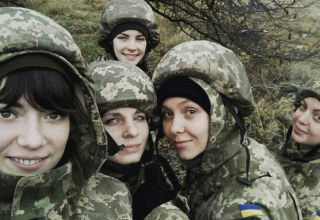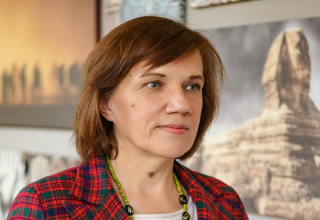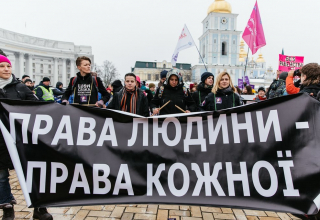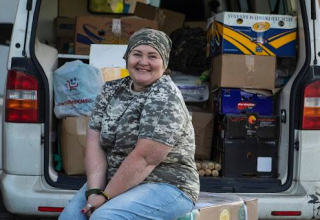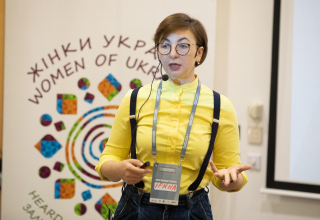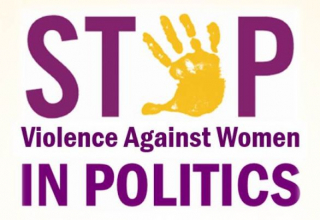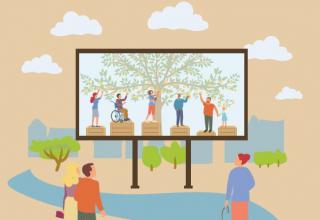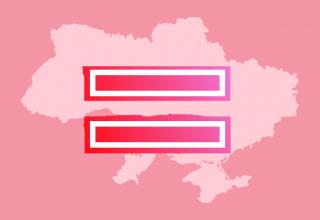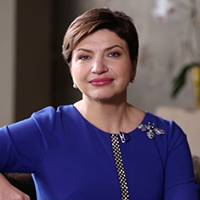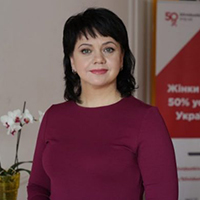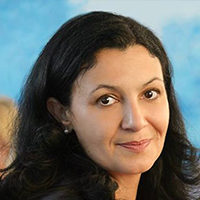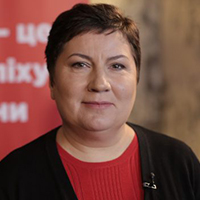Як жінкам ведеться в армії? Чи просто їм отримувати бойові посади? З якими стереотипами та упередженнями доводиться стикатися? Чи є в армії місце для сексуальних домагань?
Про це ми запитали в сімох українських військовослужбовиць, більшість із яких воліли залишитися анонімними.
Історія перша: «На початку своєї кар’єри я сама поширювала гендерні стереотипи»
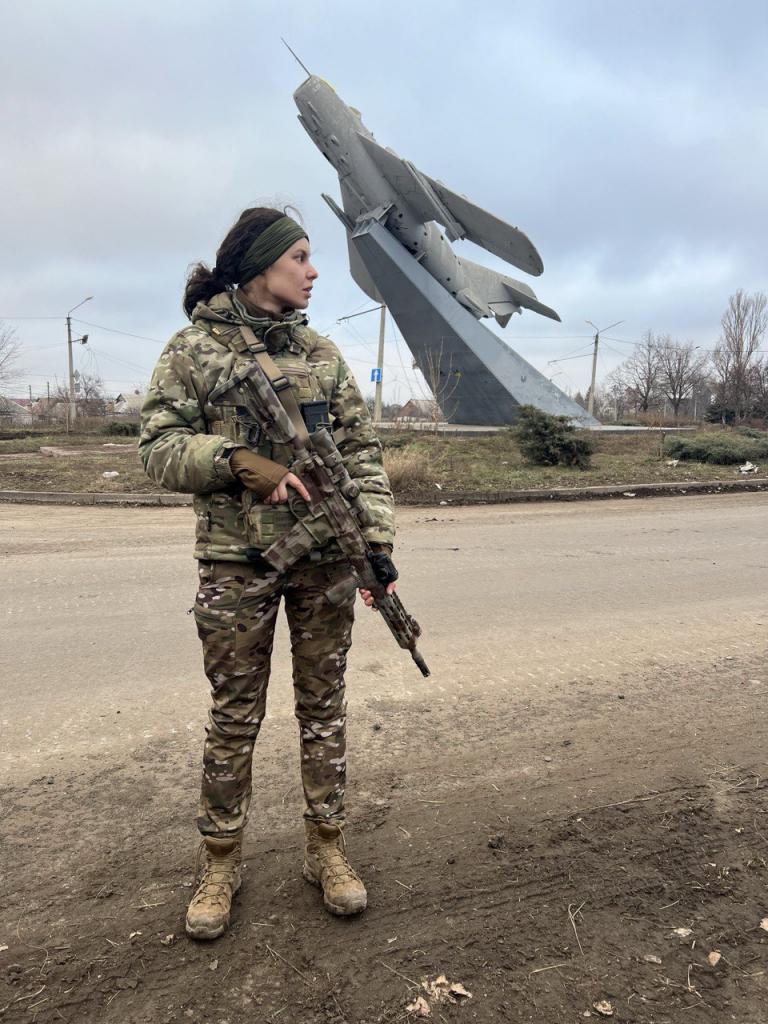
Христина з позивним «Кудрява» — офіцерка Національної гвардії України. Її шлях як військової розпочався в Івано-Франківську у квітні 2013 року з підписання контракту. Спочатку працювала на посаді керівниці культурним дозвіллям військовослужбовців та роботи з громадськістю.
«Щодо упереджень та сексизму у війську, то вони супроводжують мене всі десять років моєї служби. І скажу навіть більше — на початку своєї кар’єри я сама поширювала гендерні стереотипи, жила в парадигмі патріархального світу, розділяла професії на жіночі та чоловічі, вважала, що в будь-якому середовищі «жінка повинна залишатися жінкою». І транслювала це своїм військовослужбовцям. Проте з часом ця риторика змінилася. І тоді «жінка повинна залишатися жінкою» перетворилося на «людина повинна залишатися людиною». Незалежно від обставин, місця, посади й часу, в якому вона перебуває», — каже Христина.
Проблема, яка завдала їй труднощів під час служби, – це те, що жінок відгороджували від повсякденної роботи та військової підготовки. За словами захисниці, бійчині рідше їздили на полігон, тренувалися зі зброєю, у них було менше дисциплін, пов’язаних зі службою. Навіть сьогодні, в умовах війни, жінка має доводити, що гідна виконувати свої безпосередні обов’язки. У чоловіків такого клопоту немає.
«Коли я вирішила будувати військову кар’єру, то вступила до вишу для отримання офіцерського звання. Тоді я зіткнулася з тим, що після трьох років контракту у мене мав би бути певний багаж знань і досвід. Але на жаль, цього не було. Мені стало некомфортно. Я почала аналізувати, чому так сталося. І зрозуміла, що чоловіки обмежують жінок, хочуть їх відгородити й таким чином уберегти. А потім це позначається на нашому професійному розвитку».
Читайте також: Рух Veteranka запустив подкаст про жінок на бойових посадах
За словами Христини, жінкам часто складно позиціонувати себе як командиркок. Адже парадигма у патріархальному суспільстві така, що жінка нібито не може командувати чоловіками. Хоча є чимало жінок, які володіють необхідними лідерськими якостями, щоб брати відповідальність за підрозділ.
«Про гендерну рівність потрібно говорити не тільки в армії, а й у суспільстві загалом. Адже гендерні стереотипи поглинаються якщо не з молоком матері, то з дитячого садочка точно. Ми й надалі розділяємо жіночі та чоловічі спеціальності, ще досі з телевізора нам говорять про те, хто й чим повинен займатися. Я не кажу про всі інші види дискримінації, наприклад, за віком чи наявністю дітей», — переконана військова.
Історія друга. «До бойових посад не дуже хочуть допускати»

Військова з позивним «Ліліт» хотіла в армію ще 2014 року. Незважаючи на те, що деякі родичі пішли захищати країну, родина її ідеї не схвалила. Все зводилося до того, що це чоловіки служать, а їй потрібно бути корисною тут. Ліліт вирішила, що у випадку повномасштабного вторгнення вона піде до війська. Так і сталося.
«Якщо жінка не має конкретної військової спеціальності, то її ставитимуть на більш тилові посади. Але до бойових не дуже хочуть допускати. Керуючись тим, що «ніт, там можна загинути, там складно». На жаль, такі проблеми є і зараз. Але враховуючи, як багато дівчат показали дуже хороші результати саме на бойових посадах — таких проблем, мабуть, стало менше».
Водночас бійчині доводилося чути закиди на кшталт «вона прийшла мужика знайти» чи «зараз заміж, а потім — у декрет». Коли військова хотіла поїхати в більш небезпечну ділянку фронту, їй голосили «тобі дітей ще народжувати!» Не обійшлося, на жаль, без небажаного флірту та «підкатів» із боку деяких чоловіків. Проблема поглибилася після приходу нового командира. Ліліт навіть довелося розіграти стосунки з одним військовим. Просто для того, щоб до неї вже не чіплялися.
«Ми достатньо довго грали роль пари. І його особливо не чіпали, і мене. Не всі розуміють, що таке «ні». В принципі, таке багато де трапляється. І в цивільному житті я також із цим стикалася не раз. Коли двічі, тричі говориш «ні», а чоловік не розуміє. Думає, що ти ціну собі набиваєш. І продовжує досить наполегливо добиватися твоєї уваги», — пригадує військова.
«Якщо жінка йде в армію, вона розуміє, на що підписується»
Згодом Ліліт захотіла піти в одну зі штурмових бригад. Там служили друзі, з якими військова проходила тренування. Вони добре знали, що Ліліт — не та людина, яка десь тихенько відсиджуватиметься. Але її плани сприйняли без ентузіазму.
«Вони казали: «Працювати на виїздах — ні. Бо ти дівчина. Наприклад, тебе буде поранено. Якщо це чоловік, ми могли б його залишити без найменших докорів сумління. А жінку покинути не можемо. При тому, що це може бути провалене завдання, що може загинути вся група». З одного боку — так, тебе не покинуть, класненько. А з іншого — не покинуть лише тому, що ти жінка. Тебе не сприймають як бойового побратима. Хоча ти можеш бути крутою військовою, таким собі Рембо в спідниці. І вони це говорили неодноразово: «ти молодчина, але ні».
Читайте також: «Патріархат — це постріл у ногу»: підсумки дискусії про потреби жінок у війську
Потім пропонували тилові посади, закликали тихенько сидіти та перекладати папірці. Також військова чула нарікання, що жінкам треба створювати якісь особливі побутові умови. Ліліт із цим не проходжується. Бо в армії вона живе в таких самих умовах, як і чоловіки.
«Треба говорити, що жінки в армії мають бути. Війна в нас надовго. Рано чи пізно прийдуть до того, що мобілізовуватимуть активніше. І жінок також. Багато дівчат ідуть добровільно до війська. Вони вчаться на бойові посади, йдуть в артилерію, в піхоту, в снайперки. Мабуть, немає жодної військової спеціальності, де б не було жінок. І говорити: «сиди вдома та вари борщі» чи «складай папірці» — це неправильно. Адже жінку треба судити за фізичною спроможністю, підготовкою, мотивацією. У мене були хлопці, які казали: «краще нормальна жінка, яка знала, куди йшла, ніж матусин синочок, якого впіймали та запхали в армію. І він тут ниє і трясеться під кожним обстрілом». Якщо жінка йде в армію, вона розуміє, на що підписується».
Історія третя. «Навіть друзі, які вважають себе профеміністами, сипали жартами замість путніх порад»

Інша військова, яка поділилася своєю історію, жила в Києві. До повномасштабного вторгнення працювала редакторкою. Але після 24 лютого вирішила піти служити. На той момент киянка, крім непоганої фізичної підготовки, не мала жодних корисних навичок. Тому почала їх здобувати – покращила фізичну форму, навчилася водити авто, опанувала керування безпілотниками. Восени 2022 року вона спробувала стати на облік.
«І тут розпочалися перші веселощі. Працівник ТЦК порадив мені прийти після війни, бо зараз треба вчити чоловіків військовій справі. Взимку 2022 я прийшла в інший ТЦК, щоб спробувати ще раз. Мені сказали, що з моєю освітою люди не потрібні, але порадили піти вчитися на бухгалтерку. Хоча мене зовсім не цікавила робота в тилу. Я заповнювала безліч анкет, але мені не відписували. Запитувала у друзів, але вони або не радили йти в їхній підрозділ, або їхні командири відмовляли, коли виявлялося, що кандидат із навичками такмеду й управління дроном – це жінка. Навіть друзі, які вважають себе профеміністами, сипали жартами замість путніх порад».
Загалом жінка отримала 14 (!) відмов. До того ж, військовослужбовиці неодноразово доводилося чути фрази на кшталт «навіщо ви йдете, у вас же така хороша робота?», «що ваш чоловік думає про це?», «ви не розумієте, що робите», «ви можете піти звідси й жити нормально». Замість того, щоб брати ці закиди до уваги, жінка продовжувала вчитися такмеду, пройшла курси операторки БПЛА, покращила своє здоров’я, підкачалася. На п’ятнадцятий раз у неї таки вийшло. Бійчиня нарешті знайшла підрозділ, де її цінують за навички й готовність навчатися.
«Спочатку з жінок треба зняти тягар репродуктивної праці»
«Я не кажу публічно, що я пішла служити, – зізнається киянка. – І не планую. Бо бачила, скільки хейту виливається на захисниць у соцмережах. Поки я не була на завданнях. Це може викликати сумніви в собі. А військовим важливо вірити в себе – і жінкам, і чоловікам. Я думаю, що таких жінок, як я, які готові вчитись і йти служити, багато. Але немає системи їх рекрутингу. У ТЦК мене лише відлякували. Якщо б жінок заохочували (саме заохочували тих, хто хоче, а не мобілізовували), то сили оборони отримали би спеціалісток, яких вони зараз так потребують».
За її словами, тут би стали в пригоді жіночі підрозділи, якими командують жінки. Тоді б усі питання щодо того, чи може жінка підняти коробку й ризикувати життям, просто б не виникали. Водночас військовій не до вподоби ідея мобілізації всіх жінок.
«Спочатку з них треба зняти тягар репродуктивної праці. Я солідарна з позицією ГО «Ветеранка» в цьому питанні. І ще додам: думаю, що ситуація зміниться, бо іншого виходу наразі немає. Війську потрібні люди. І структурам доведеться реформуватися або зламатися. Це стосується не лише заохочення жінок до служби. Це і про корупцію, і про бюрократію, і про адекватний менеджмент у армії», — наголосила бійчиня.
Історія четверта. «Ти цінна, коли в тебе вислуга, навички й досвід»
Ірина Бобик прийшла у військо за два роки до початку повномасштабної війни.
«Тоді був кадровий голод, і молодих, здорових, адекватних жінок брали охоче. Моя мотивація була своєрідною: я вважала, що те, що називають АТО-ООС, затягнеться на десяток років. Як волонтерка я спілкувалася з військовими, бачила, що вони не продовжують контракти й ідуть. І розуміла, що громадянський обов’язок – замінити їх на посту. Бойові дії в ті роки не були такими, як зараз. Але вони були, хоч більшість цього не помічала. Час підтвердив правильність мого рішення – я зустріла повномасштабку цілком готовою.
Коли новобранка приходить у підрозділ, де вона нікого не знає й ніхто не знає її – зазвичай її сприймають у штики. Як казала Оля Сімба, «коли приходить чоловік, він молодець, поки не доведе протилежне. Якщо приходить жінка, то вона — курва, поки не доведе протилежне».
Читайте також: Андріана Ковалишин: Коли я в «пікселі» чи в «мультикамі», чоловіки відразу опускають очі
Цінність військової зростає, каже Ірина. Але жінці доводиться бути ідеальною та працювати вдвічі більше за середній показник у підрозділі. Тільки тоді її поважатимуть. Також жінка може зіткнутися з низкою неприємних моментів. Приятель по службі може почати чіплятися. Право вийти на бойові доведеться виборювати. Попри хороші навички в стрільбі, можуть відправити вчитися на медикиню.
«Уже згодом, перевівшись в інший підрозділ, я змогла змінити військову професію. Ситуація трохи кращає, я це помічаю. Люди звикають до жінок на бойових посадах. Навіть до того, що жінка – їхня командирка, інструкторка, більш досвідчена бійчиня в підрозділі. Але ти цінна, коли в тебе вислуга, навички й досвід. Я бачу по своїх подругах, як неохоче беруть тепер новобранок без досвіду на службу на бойові посади. Це справді паскудно, бо хлопців без досвіду беруть охоче», — каже Ірина Бобик.
Історія п’ята. «Ти жінка – і тому в цьому батальйоні сапером не будеш»

Військова, яка просила не називати її імені, пригадує, що коли почалася повномасштабна війна, вона вирішила піти до тероборони. Через наявність медичної освіти її призвали до ЗСУ на посаду санітарки-радіотелефоністки. З сексизмом зіткнулася з першого дня своєї служби. Наразі в її батальйоні лише дві жінки. А керівний склад – це колишні радянські офіцери, які не розуміють, що людина прийшла в армію добровільно.
«Через два місяці моєї служби медиком, а точніше санітаркою, прибиральницею, кухарем тощо (суто «жіночі» обов’язки, як вони говорили), я вирішила перевестися до іншого підрозділу. Мене дуже захопила саперна справа. І я твердо вирішила, що це моє. Ще пару місяців займалася папірцями в стройовій, щоб добитися цього переводу. І коли в мене нарешті вийшло, нас відправили на Донбас. Там понад рік я охоче працювала, підривала, ставила міни нарівні з хлопцями. І коли ми невеликою групою зайшли в сіру зону, щоб поставити пастки, мій командир подав мене на підвищення. А натомість комбат, дізнавшись про це, заборонив мені виходи на позиції. Ще якийсь час я просилася, ходила неофіційно», — розповідає військовослужбовиця.
Керівництво згодом її викликало та заявило, що на позиції вона вже не ходитиме. Тому не може залишатися зі своїм підрозділом і мусить перевестися в штаб на папери. На всі аргументи була одна відповідь: «Ти жінка – і тому в цьому батальйоні сапером не будеш. І на позиції теж не ходитимеш». Військову перевели до роти працювати санітаркою, хоча на ділі посадили в штаб за папери.
«Далі був нервовий зрив, лікування, реабілітація. Приймати важкі препарати треба ще рік. Думаєте, на цьому все закінчується? Ні. Відразу після лікування мене знову починають смикати. Переводити в стройову частину, потім у медпункт, звідки я починала. Наразі я знову займаюся прибиранням і приготуванням їжі. Із сексизмом із боку керівництва тяжко боротися. Але я ще не здаюся. Написала рапорт на переведення в резервну роту, щоб піти звідси. Але мене не відпускають», — зауважила бійчиня.
Історія шоста. «Перепоною я б назвала ставлення до жінок, як до квіточок, яких треба берегти»

Ця військова думала піти в армію ще 2014 року, хоча на той момент була надто юною. Але після повномасштабного вторгнення зрозуміла, що час. Для її близького оточення мобілізація не стала сюрпризом. Потрапити в армію було непросто, адже жінка хотіла саме на бойову посаду. Але всюди, куди вона телефонувала, одразу заявляли, що «жінка – в штаб».
«По суті я півроку шукала посаду. Та й то мене взяли через велику нестачу кадрів. І я мала знайомих, які могли за мене поручитися. Тому перепоною я б назвала ставлення до жінок, як до квіточок, яких треба берегти. Проте дрібних і об’єктивно слабких чоловіків ніхто не оберігає. Кожен, хто дізнавався про мою мобілізацію, робив висновок, що я або медик, або на медика. Але це упередження. Я принципово не хотіла бути медиком, адже це надто тяжка робота для мене. Потрібно емоційно включатися. На навчаннях узагалі був жах, бо не домагався там тільки лінивий. Та й ставлення до нас було як до немічних», — каже бійчиня.
За її словами, якість навчання була така, що часом захисниця мусила показувати хлопцям, як правильно користуватися автоматом. Дехто сприймав це скептично. Адже є стереотип, що жінка не може вміти користуватися зброєю.
А ось у батальйоні ситуація в сенсі сексизму ліпша. Вона там — єдина жінка на бойовій посаді, як і всі, ходить на чергування. За словами військової, у чоловіків це викликає подив, але й повагу також. Хоча спершу вони були налаштовані до неї скептично.
Історія сьома. «Я стикаюся з сексизмом та мізогінією ледь не щодня»

«Я не могла стояти осторонь, мені було важливо вплинути на ситуацію, — розповіла інша військова. — Я вирішила йти у військо, бо відчувала в собі сили, а головне — мала глибинну мотивацію. Держава потребувала мене. Батько спершу думав, що це просто якісь тренування, розваги. Але як поїхали на схід, то почав переживати, збагнув, що дочка пішла в ЗСУ. Друзі й подруги поставилися з розумінням. Записалася у львівське ТРО. Мобілізували мене не одразу, а після місяця «служби». Бо забули. Весь березень та квітень я тимчасово займалася психологічними тестуваннями. Хотіла в піхоту».
Читайте також: Людмила Ясененко, медикиня: Мені говорили, що я маю народжувати дітей і варити борщ
Але її записали в діловодки. Близько року військова добивалася переведення в бойовий підрозділ. У піхоту її не брали, сміялися з таких намірів. А людей там усе меншало. Зараз військова служить у мінометній батареї. Проте її все ще гальмують і не дають робити те, заради чого вона пішла на службу.
«Сумніваються в мені, хоча я не гірша за інших бійців. Просто тому, що я жінка. Я стикаюся з сексизмом та мізогінією ледь не щодня. Дурні стереотипи, постійне акцентування на статі, інфантилізація, знецінення та зневага. Домагання вербальні та невербальні. Чоловіки постійно акцентують на стереотипі, буцімто жінки немічні та слабкі. Кицяють, сонечкають і тикають, дивлячись згори вниз. Коли щось розвантажуємо, виривають коробки з рук, створюючи травматичні ситуації. Відмовляють мені в поїздках на бойові, бо їм мене «шкода». Наче я немічна десятирічна дитина. Ставляться як до недолюдини. Або як до дитини. І це – під прикриттям добрих намірів».
«Жінок в армії зневажають, сексуально об’єктивують, домагаються і знецінюють»
«Коментують моє тіло. Часто дозволяють собі сексуалізовані коментарі. Деякі чоловіки лізуть обійматися, деякі — цілують, ігноруючи обурення. Були також ляскання по сідницях. Побратими часто дозволяють собі обійняти за плечі, талію чи нижче, попри моє обурення. Чоловіки за спиною обговорюють посестер як шматки м’яса. А деякі й в обличчя. Мені пропонували секс люди, з якими в мене були лише робочі стосунки», — обурюється військова.
Також, за її словами, є проблема зі скляною стелею. Жінкам неймовірно важко прорватися на командирські чи просто важливі посади, їх знецінюють, зневажають, насміхаються. Наприклад, між чоловіком та жінкою з аналогічними навичками перевагу нададуть першому. Навіть якщо він менш надійний або взагалі алкоголік. Рапорт військової щодо сексизму ігнорували два місяці, а коли вона наполягла на розгляді — погрожували зробити винною і стягнути кошти. Так само ігнорували скаргп про домагання до інших жінок, а незгодних просто карали.
«Люди думають, що основна проблема жінок в армії – це відсутність державних тампонів і штанів, куди влізуть стегна. Ні, жінок в армії зневажають, сексуально об’єктивують, домагаються і знецінюють – це більш травматична проблема. Ми змушені воювати на два фронти. Далеко від дому та звичних справ, покинувши навчання, роботу чи дітей, ми пішли боронити країну. І змушені захищатися від своїх і заслуговувати базову повагу. Важливо говорити про рівність, бо зараз ставлення до військовослужбовиць – як до людей другого ґатунку. Якщо ми хочемо виграти війну і зробити військо сильнішим, ми повинні навчитися поважати жінок. І дати їм ті права, задовольнити ті матеріальні потреби, що мають і чоловіки».
«Для армії сексизм — це недостатня реалізація жіночого потенціалу»

Проблема дискримінації жінок існує і в армії, і в суспільстві загалом. На цьому наголошує виконавча директорка Інституту гендерних програм Марина Лазаренко. За її словами, соціум і донині намагається вписати жінок у певні рамки. Їм продовжують указувати, що вони мають робити і який вигляд мати. Жіночий досвід досі знецінють, а можливості обмежують через упереджене ставлення.
«Хтось вважає, що має право оцінювати, принижувати та знецінювати жінок. Це стосується й коментарів, і недоречних посмішок та натяків. Як у суспільстві загалом, так і щодо військовослужбовиць та ветеранок. Тут можна згадати публічні інциденти щодо «не десять із десяти» і «як воюють жінки, діти та собаки». І те, з чим можна зіткнутися щодня: ось це «жіночко, та що ви можете знати». І те, що чують ветеранки, коли показують своє (посвідчення) УБД. І те, що військовослужбовиці, окрім того, що виконують бойові завдання, змушені ще доводити, що вони це реально можуть робити. І найважче, на мою думку, коли такі коментарі можна почути від інших жінок», — каже Марина Лазаренко.
За її словами, крім матеріального забезпечення, невирішеним залишається питання щодо можливостей отримувати військове звання. Адже досі є упередження щодо жінок на керівних посадах у війську.
Експертка також додала, що наразі немає механізмів реагування на сексуальні домагання та насильство щодо військовослужбовиць.
Але водночас зміни є, каже Марина Лазаренко. І це дає надію. Зокрема вона згадала останнє дослідження «НБ 5.0. Моніторинг рекомендацій і результатів досліджень» із циклу «Невидимий батальйон». Його дослідниці проаналізували зміни в гендерній політиці у військовій сфері за період із 2014 до 2023 року. Вони відзначили такі досягнення, як відкриття бойових посад для жінок, ухвалення закону «Про внесення змін до деяких законів України щодо забезпечення рівних прав і можливостей жінок і чоловіків під час проходження військової служби у Збройних Силах України та в інших військових формуваннях», а також надання дівчатам можливості навчатися у військових ліцеях.
«Окрім того, у позитивний бік змінилися підходи медіа щодо висвітлення служби військовослужбовиць. Жінки з’явилися на фото та відео офіційних сайтів, сторінок підрозділів та закладів військової освіти. Та і матеріали у ЗМІ про них стали більш професійними», — наголосила Марина Лазаренко.
Жінки вмотивовані, професійні й мають величезний потенціал, що може підсилити армію
За словами Марини Лазаренко, питання гендерної рівності у війську досі актуальне. Вона переконана, що в армії насамперед мають оцінювати особисті якості та компетенції, рівень підготовки та мотивацію. І там не має виникати питань щодо чиєїсь статі, гендеру, сексуальної орієнтації, віку чи кольору шкіри. Якщо людина може якісно та професійно виконувати свої завдання, готова розвиватися та вдосконалюватися, то вона повинна мати можливість захищати свою країну.
«Під час повномасштабного вторгнення важко говорити на такі теми. Але вони важливі. Бо Україна унікальна великою кількістю добровольців, які прийшли в армію, маючи за плечима зовсім інший досвід. Але вони швидко вчаться та підсилюють армію за рахунок компетенцій, які приносять із цивільного життя (бізнесу, громадського сектору). І за моїми спостереженнями, у підрозділах, де є добровольці, мотивація та атмосфера зовсім інша, ніж там, де зібрані люди «по мобілізації». Але тут ще величезну роль відіграють командири», — зауважує Марина Лазаренко.
На її думку, сьогодні нам потрібно сформувати культуру професійних стосунків – причому як у військовій сфері, так і в цивільному житті. Також тут не обійдеться без просвітницької діяльності та формування системи, що не толерує дискримінації в будь-якій формі.
«Зараз усе це залежить від командирів. Чула про підрозділи, де жінок сприймають як рівних, як професіоналок. І про підрозділи, де військовослужбовиці змушені щодня захищати себе від нападок побратимів, де на офіційних сторінках можуть з’являтися матеріали, які їх знецінюють. Але жінок стає все більше. Вони вмотивовані, професійні й мають величезний потенціал, що може підсилити армію. Думаю, що тут також варто говорити про створення своєрідного етичного кодексу в армії. І він має бути сформованим за цією внутрішньою потребою, має бути про гідність, повагу до кожного та кожної, хто взяв на себе обов’язок захищати країну. І в суспільстві має формуватися культура поваги до військових та ветеранської спільноти», — підсумувала Марина Лазаренко.
Юлія Гуш
“We are forced to fight on two fronts”: stories of women in the army
What is it like for women in the army? Is it easy for them to get combat positions? What stereotypes and prejudices do they face? Is there a place for sexual harassment in the army?
We asked seven Ukrainian servicewomen, most of whom preferred to remain anonymous, about this.
Story one: “At the beginning of my career, I spread gender stereotypes myself”
Khrystyna, with the call sign “Kudriava,” is an officer in the National Guard of Ukraine. Her career as a military officer began in Ivano-Frankivsk in April 2013 when she signed a contract. At first, she worked as the head of the military’s cultural leisure and public relations.
“As for prejudice and sexism in the army, they have accompanied me for all ten years of my service. And I will say even more – at the beginning of my career, I myself spread gender stereotypes, lived in the paradigm of the patriarchal world, divided professions into women’s and men’s, believed that in any environment “a woman should remain a woman”. And I signaled this to my military personnel. However, over time, this rhetoric changed. And then “a woman must remain a woman” turned into “a person must remain a person.” Regardless of the circumstances, place, position, and time in which she is,” says Khrystyna.
The problem that caused her difficulties during her service was the fact that women were fenced off from everyday work and military training. According to the defender, women soldiers went to the training ground less often, trained with weapons, and had fewer disciplines related to service. Even today, in times of war, a woman has to prove that she is worthy of performing her immediate duties. Men do not have to do this.
“When I decided to pursue a military career, I entered a university to obtain an officer’s rank. Then I was faced with the fact that after three years of contract I should have had a certain amount of knowledge and experience. But unfortunately, I didn’t. I felt uncomfortable. I began to analyze why this happened. And I realized that men limit women, want to fence them off and thus protect them. And then it affects our professional development.”
Read also: Veteranka movement launches podcast about women in combat positions
According to Khrystyna, it is often difficult for women to position themselves as commanders. After all, the paradigm in a patriarchal society is that a woman is supposedly unable to command men. However, there are many women who have the necessary leadership skills to take responsibility for a unit.
“We need to talk about gender equality not only in the army, but also in society as a whole. After all, gender stereotypes are absorbed, if not with mother’s milk, then from kindergarten for sure. We continue to separate women’s and men’s specialties, and we are still told on TV who should do what. I am not talking about all other types of discrimination, for example, based on age or presence of children,” the soldier is convinced.
Story two. “They don’t really want to allow me to take up combat positions”
A soldier with the call sign “Lilith” wanted to join the army back in 2014. Despite the fact that some of her relatives went to defend the country, her family did not approve of her idea. It all boiled down to the fact that men were serving, and she needed to be useful here. Lilith decided that in case of a full-scale invasion, she would join the army. And so it happened.
“If a woman does not have a specific military specialty, she will be assigned to more rear positions. But they don’t really want to let her join the combat positions. The reasoning is that ‘no, you can die there, it’s difficult’. Unfortunately, such problems still exist today. But given how many girls have shown very good results in combat positions, there are probably fewer such problems nowadays.”
At the same time, she has heard accusations such as “you came to find a husband” or “first you will get married, and then – go on maternity leave”. When the soldier wanted to go to a more dangerous part of the frontline, she was told “you have children to give birth to!” Unfortunately, there was instances of unwanted flirting and “hits” from some men. The problem worsened after the arrival of a new commander. Lilith even had to stage a relationship with one soldier. Just to stop being picked on.
“We played the role of a couple for a long time. He was not particularly questioned about this, and neither was I. Not everyone understands what ‘no’ means. In fact, this happens everywhere. And in my civilian life, I’ve also encountered this more than once. When you say “no” two or three times, the man doesn’t understand. He thinks that you’re making a big deal out of it. And he continues to persistently seek your attention,” the soldier recalls.
“If a woman joins the army, she understands what she is signing up for”
Later, Lilith wanted to join one of the assault brigades. Her friends, with whom she had trained, served there. They knew well that Lilith was not the kind of person who would sit quietly somewhere. But they were not enthusiastic about her plans.
“They said: “You can’t work on the road. Because you are a girl. For example, you might get injured. If it was a man, we could leave him without the slightest remorse. But we cannot leave a woman behind. Even though it could be a failed mission, and the whole group could die.” On the one hand, yes, they won’t leave you behind, that’s great. On the other hand, they won’t leave you behind just because you’re a woman. You are not perceived as a combat sworn brother. Although you can be a cool military woman, a kind of Rambo in a skirt. And they said it repeatedly: “You’re good, but no”.
See also: “Patriarchy is a shot in the foot”: the results of the discussion on the needs of women in the army
Then she was offered rear positions, urged to sit quietly and transfer papers. She also heard complaints that women needed to be provided with special living conditions. Lilith does not agree with this. Because in the army she lives in the same conditions as men.
“I have to say that women should be in the army. We are in the war for a long time. Sooner or later, they will come to the point where they will mobilize more actively. And women will be mobilized as well. Many girls join the army voluntarily. They train for combat positions, go to the artillery, infantry, snipers. Perhaps there is not a single military specialty where there are no women. And to say: “stay at home and cook borscht” or “fold papers” is wrong. After all, a woman should be judged by her physical ability, training, and motivation. I had guys who said: “I’d rather have a normal woman who knew where she was going than a mama’s boy who was caught and shoved into the army. And he is here whining and shaking under every shelling.” If a woman joins the army, she understands what she is signing up for.”
Story three. “Even my friends who consider themselves pro-feminists made jokes instead of giving me good advice”
Another soldier who shared her story lived in Kyiv. Before the full-scale invasion, she worked as an editor. But after February 24, she decided to join the military. At that time, the Kyiv woman had no useful skills other than good physical fitness. So she began to acquire them: she improved her physical fitness, learned to drive a car, and mastered the use of drones. In the fall of 2022, she tried to register for the military.
“And then the first fun began. A CCC worker advised me to come after the war, because now it is necessary to teach men military skills. In the winter of 2022, I came to another CCC to try again. They told me that they didn’t need people with my education, but advised me to study accounting. Although I was not at all interested in working in the rear. I filled out a lot of questionnaires, but I didn’t get any responses. I asked my friends, but they either did not advise me to join their unit or their commanders refused when it turned out that the candidate with the skills of tactical and drone control was a woman. Even friends who consider themselves pro-feminists would make jokes instead of giving me good advice.”
In total, the woman received 14 (!) rejections. In addition, the servicewoman has repeatedly heard phrases like “why are you leaving, you have such a good job?”, “what does your husband think about it?”, “you don’t understand what you are doing”, “you can leave here and live a normal life”. Instead of taking these criticisms into account, the woman continued to learn tacmed, took a UAV operator’s course, improved her health, and got fit. On the fifteenth attempt, she succeeded. The fighter finally found a unit where she is appreciated for her skills and willingness to learn.
“First, women should be relieved of the burden of reproductive labor”
“I don’t say publicly that I went to serve,” admits the Kyiv woman, “and I don’t plan to. Because I saw how much hate is poured out on female defenders on social media. While I was not on missions. This can cause self-doubt. And it is important for the military people to believe in themselves, both women and men. I think there are a lot of women like me who are ready to study and serve. But there is no system for recruiting them. At the CCC, they only scared me away. If women were encouraged (those who are willing were encouraged, not mobilized), the defense forces would get the specialists they need now.”
According to her, women’s units commanded by women would be useful. Then all questions about whether a woman can lift a box and risk her life would simply not arise. At the same time, she does not like the idea of mobilizing all women.
“First, they need to be relieved of the burden of reproductive labor. I am in solidarity with the position of the Veteran’s NGO on this issue. I would also add: I think the situation will change, because there is no other way out now. The army needs people. And the structures will have to reform or break. This is not just about encouraging women to serve. It is also about corruption, bureaucracy, and adequate management in the army,” the fighter emphasized.
Story four. “You are valuable when you have seniority, skills and experience”
Iryna Bobyk joined the army two years before the start of the full-scale war.
“There was a staff shortage at the time, and young, healthy, adequate women were readily accepted. My motivation was peculiar: I believed that what is called the ATO-JFO would drag on for a decade. As a volunteer, I talked to the military and saw that they were not renewing their contracts and leaving. And I realized that it was my civic duty to replace them. The fighting in those years was not like it is now. But they were battles, although most people did not notice it. Time confirmed the correctness of my decision – I met the full-scale war fully prepared.
When a new recruit comes to a unit where she doesn’t know anyone and no one knows her, she is usually met with hostility. As Olya Simba used to say, “When a man comes in, he’s a good guy until he proves otherwise. If a woman comes, she is a whore until she proves otherwise.”
Read also: Andriana Kovalyshyn: When I’m in pixels or cartoons, men immediately look down
The value of a military woman is growing, says Iryna. But a woman has to be perfect and work twice as hard as the average in the unit. Only then will she be respected. A woman can also face a number of unpleasant moments. A fellow soldier may start picking on her. She will have to fight for the right to go on combat missions. Despite her good shooting skills, she may be sent to study medicine.
“Later, when I was transferred to another unit, I was able to change my military profession. The situation is getting better, I can see it. People are getting used to women in combat positions. Even to the fact that a woman is their commander, instructor, and more experienced fighter in the unit. But you are valuable when you have seniority, skills and experience. I can see from my friends how reluctant they are to recruit new recruits without experience for combat positions. It really sucks, because guys with no experience are readily accepted,” says Iryna Bobyk.
Story Five. “You are a woman, so you will not be a sapper in this battalion”
The woman, who asked not to be named, recalls that when the full-scale war started, she decided to join the city territory defense unit. Because she had a medical degree, she was drafted into the Armed Forces as a radio operator. She faced sexism from the first day of her service. Currently, there are only two women in her battalion. And the leadership is made up of former Soviet officers who do not understand that a person joined the army voluntarily.
“After two months of my service as a medic, or rather as a nurse, cleaner, cook, etc. (purely ‘female’ duties, as they said), I decided to transfer to another unit. I was very interested in sapper work. And I firmly decided that it was mine future occupation. I spent a couple of months doing paperwork in the drill room to get this transfer. And when I finally succeeded, we were sent to Donbass. For more than a year, I willingly worked there, blowing up mines and planting them alongside the guys. And when we went into the gray zone with a small group to set traps, the head of my unit nominated me for promotion. But when the commander found out about it, he forbade me to go to the positions. For some time, I begged to go unofficially,” says the soldier.
Later, her superiors called her in and told her that she would no longer be going to the positions. Therefore, she could not stay with her unit and had to transfer to the headquarters to do paperwork. There was only one answer to all her arguments against this decision: “You are a woman, so you will not be a sapper in this battalion. You will not go to the positions either.” The soldier was transferred to another unit to work as a nurse, although she was actually assigned to the headquarters for paperwork.
“Then there was a nervous breakdown, treatment, rehabilitation. I have to take heavy medications for another year. Do you think that’s the end of it? No, it is not. Immediately after treatment, I started to get twitchy again. They transfer me to a combat unit, then to the medical center where I started. Now I am back to cleaning and cooking. It’s hard to fight sexism from the leadership. But I am not giving up yet. I wrote a report for transfer to the reserve company to get out of here. But they won’t let me go,” the woman said.
Story six. “I would call the attitude to women as flowers that need to be protected an obstacle”
This woman was thinking of joining the army back in 2014, although she was too young at the time. But after the full-scale invasion, she realized it was time. For her close circle, her mobilization was not a surprise. It was not easy to get into the army, because she wanted a combat position. But wherever she called, they immediately said that “a woman is going to the headquarters.”
“In fact, I was looking for a position for six months. And even then, I was hired because of a great shortage of personnel. And I had friends who could vouch for me. Therefore, I would call the attitude towards women as flowers that need to be protected an obstacle. However, no one protects small and objectively weak men. Everyone who learned about my mobilization concluded that I was either a doctor or a doctor’s student. But this is a prejudice. I didn’t want to be a doctor on principle, because it’s too hard work for me. You need to be emotionally involved. The training was a nightmare, because only the lazy didn’t strive there. And we were treated as weaklings,” says the fighter.
According to her, the quality of the training was such that sometimes the defender had to show the guys how to use the machine gun correctly. Some were skeptical. After all, there is a stereotype that women cannot use weapons.
But the situation in the battalion is better in terms of sexism. She is the only woman in a combat position there, and she goes on duty like everyone else. According to the soldier, the men are surprised by this, but also respectful. Although at first they were skeptical of her.
Story Seven. “I face sexism and misogyny almost every day”
“I couldn’t stand by, it was important for me to influence the situation,” said another female soldier. “I decided to join the army because I felt strong, and most importantly, I was deeply motivated. The country needed me. At first, my father thought it was just some kind of training, some kind of entertainment. But when we went to the east, he began to worry, realizing that his daughter had joined the Armed Forces. My friends and family were understanding. I enrolled in the Lviv recruitment center. I was not mobilized immediately, but after a month of “service”. Because they forgot. Throughout March and April, I was temporarily engaged in psychological testing. I wanted to join the infantry.”
Read also: Liudmyla Yasenenko, a medical worker: They told me I had to give birth to children and cook borscht
But she was enlisted as a clerk. For about a year, she tried to get transferred to a combat unit. She was not accepted to the infantry, they laughed at her intentions. And there were fewer and fewer people there. Now she is serving in a mortar battery. However, she is still hampered and prevented from doing what she joined the service for.
“They doubt me, even though I am no worse than other soldiers. Just because I am a woman. I face sexism and misogyny almost every day. Stupid stereotypes, constant emphasis on gender, infantilization, devaluation and disrespect. Verbal and non-verbal harassment. Men constantly emphasize the stereotype that women are weak and frail. They poke and prod, looking down on us. When we unload something, they tear the boxes out of our hands, creating traumatic situations. They refuse to let me go to the battlefield because they “feel sorry for me”. As if I were a weak ten-year-old child. They treat me like a subhuman. Or like a child. And this is under the guise of good intentions.”
“Women in the army are despised, sexually objectified, harassed and devalued”
“They comment on my body. They often make sexualized comments. Some men come to hug me, some kiss me, ignoring my outrage. There were also slaps on the buttocks. My comrades often allow themselves to hug my shoulders, waist or lower, despite my indignation. Men behind my back discuss sisters as pieces of meat. And some of them- to my face. I was offered sex by people with whom I had only a working relationship,” the soldier is outraged.
She also says there is a problem with the glass ceiling. It is incredibly difficult for women to break through to commanding or simply important positions, they are devalued, despised, and ridiculed. For example, between a man and a woman with similar skills, the former will be preferred. Even if he is less reliable or an alcoholic. A military woman’s report on sexism was ignored for two months, and when she insisted on a hearing, they threatened to make her guilty and may her to pay fine. Similarly, complaints about harassment of other women were ignored, and those who disagreed were simply punished.
“People think that the main problem of women in the army is the lack of state tampons and pants that fit their hips. No, women in the army are despised, sexually objectified, harassed and devalued – this is a more traumatic problem. We are forced to fight on two fronts. Far away from home and our usual routines, we left our studies, jobs, or children to defend the country. And we have to defend ourselves from our own people and earn basic respect. It’s important to talk about equality, because nowadays women in the military are treated as second-class citizens. If we want to win the war and make the army stronger, we must learn to respect women. And to give them the same rights and satisfy the same material needs as men.”
“For the army, sexism is a lack of realization of women’s potential”
The problem of discrimination against women exists both in the army and in society as a whole. This is emphasized by Maryna Lazarenko, Executive Director of the Institute for Gender Programs. According to her, society is still trying to fit women into certain frameworks. They continue to be told what they should do and how they should look. Women’s experience is still devalued, and opportunities are limited due to prejudice.
“Some people think they have the right to evaluate, humiliate and devalue women. This applies to comments, inappropriate smiles and hints. Both in society in general and in relation to female soldiers and veterans. Here we can recall the public incidents of “not ten out of ten” and “how women, children and dogs fight”. And what you can encounter every day: this “woman, what do you know”. And what female veterans hear when they show their UBD (combat service identification). And the fact that, in addition to performing combat missions, women soldiers have to prove that they can actually do it. And the hardest thing, in my opinion, is when you hear such comments from other women,” says Maryna Lazarenko.
According to her, in addition to material support, the issue of opportunities to receive military ranks remains unresolved. There are still prejudices against women in leadership positions in the military. The expert also added that there are currently no mechanisms for responding to sexual harassment and violence against servicewomen.
But at the same time, there are changes, says Maryna Lazarenko. And this gives us hope. In particular, she mentioned the latest study “NB 5.0. Monitoring of Recommendations and Research Results” from the Invisible Battalion series. Its researchers analyzed changes in gender policy in the military sphere from 2014 to 2023. They noted such achievements as the opening of combat positions for women, the adoption of the law “On Amendments to Certain Laws of Ukraine on Ensuring Equal Rights and Opportunities for Women and Men during Military Service in the Armed Forces of Ukraine and Other Military Formations,” and the provision of girls with the opportunity to study at military lyceums.
“In addition, the media’s approach to covering the service of women has changed in a positive way. Women appeared in photos and videos on official websites, pages of units and military education institutions. And the media coverage of them has become more professional,” emphasized Maryna Lazarenko.
Women are motivated, professional and have a huge potential that can strengthen the army
According to Maryna Lazarenko, the issue of gender equality in the army is still relevant. She is convinced that the army should primarily evaluate personal qualities and competencies, level of training and motivation. And there should be no questions about someone’s sex, gender, sexual orientation, age or skin color. If a person can perform their tasks efficiently and professionally, is ready to develop and improve, they should be able to defend their country.
“It is difficult to talk about such topics during a full-scale invasion. But they are important. Because Ukraine is unique in that it has a large number of volunteers who joined the army with a completely different experience. But they learn quickly and strengthen the army with the competencies they bring from civilian life (business, public sector). And according to my observations, in units with volunteers, the motivation and atmosphere is completely different than in units with conscripts. Commanders also play a huge role here,” says Maryna Lazarenko.
In her opinion, today we need to create a culture of professional relationships, both in the military and in civilian life. It also requires educational activities and the formation of a system that does not tolerate discrimination in any form.
“Now it all depends on the commanders. I have heard about units where women are perceived as equals, as professionals. And about units where women soldiers are forced to defend themselves from attacks by their colleagues on a daily basis, where materials that devalue them may appear on official pages. But there are more and more women. They are motivated, professional, and have a huge potential that can strengthen the army. I think we should also talk about creating a kind of ethical code in the army. And it should be formed according to this internal need, it should be about dignity, respect for each and every person who has taken on the duty to defend the country. And the society should form a culture of respect for the military and the veteran community,” Maryna Lazarenko summarized.
Yulia Gush



